Dear partners and stakeholders,
We have already passed the first half of the project and are taking big steps in the right direction. The Corona pandemic has affected us all this spring, some harder than others, but it seems like we are on trac and delivering towards our goals. Get up to date with the latest news in the project. If I’ve missed anything, please let me know and we’ll include it in the next newsletter. I hope you enjoy the reading!
RIT2021 is best practice project
Tillväxtverket (TVV) is handling EU-funded projects in Sweden, and they have chosen RIT2021 as “best practice” within regional EU projects. They are planning to make a film about our work. Their film will be published later this summer.
New film about RIT2021
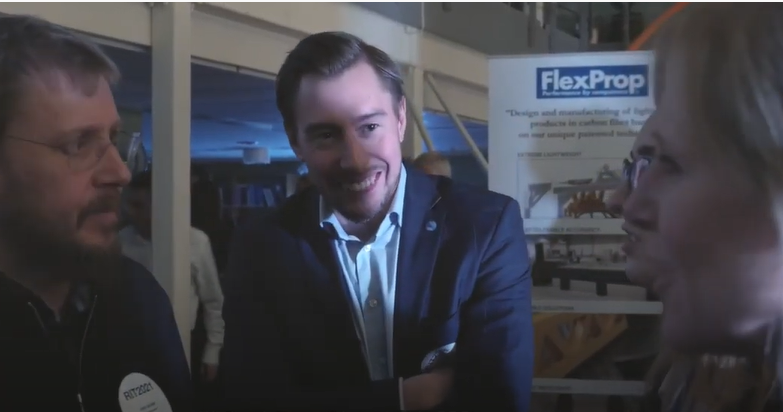
Representatives in the film from space industry and academia in discussion.
We’re proud to share with you our own video about RIT2021. Before we got to know about TVV making a film about our project we started to produce our own. Big thanks to all of you who contributed and to Viktor Björnström for the production. The film will be ready in a couple of days and the link sent out in a separate email – please share it on your social channels and organisations.
Great interest at our previous Space Innovation Forum
The space industry, academia, innovation enablers and suppliers met to mobilize around business opportunities in the fast-growing satellite market were the interest in micro launchers is high.
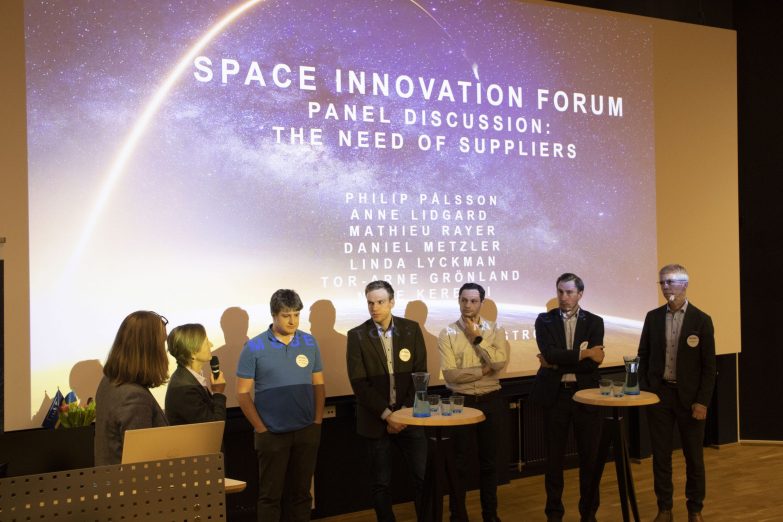
At the panel discussion Anne Lidgard, director and senior advisor at Vinnova, Sweden’s innovation authority, highlighted Norrbotten’s prerequisites already in place for an attractive space ecosystem.
Some 60 repre¬sentatives from the space industry, stu¬dents, researchers, innovation players and companies in the construction, manufac¬turing, IT and consulting industries showed up to take part of interesting presentations, a fully booked exhibition, networking and 55 one-to-one meetings. Read more about the event here or check out all the presentations here.
Our next Space Innovation Forum – Online!
The next Space Innovation Forum will be online on September 29-30, this time focusing on how to bring space data down to Earth and make successful business. The event will take place during two half days. The first morning we will have presentations and panel discussions about data handling, analytics, financing, and policies. The second morning we will have a workshop to create a successful business environment for space data applications. You can participate in both sessions or chose either of them.

Invitation to Space Innovation Forum has been sent out via email and is also found on our web site.
RIT2021 invited to present at international space congress
During IAC (International Astronautical Congress) 2019 two papers connected to the project was presented. One about the project itself: A Swedish Perspective on Innovation and Growth for Space_Final. The second was about research on using 3D printing in rocket engines: Using demonstrator hardware to develop a future qualification logic for additive manufacturing parts.
R&D projects within RIT2021
Recently, two of our PhD students have defended their doctoral theses and both have been working with challenges connected to the space industry. Applied research presents unique synergies for both industry and academia, not least knowledge transfer, but also access to expertise, data and contact networks. Kanika Garg worked together with SSC with “Autonomous Navigation System for High Altitude Balloons”. She is now working for ICEYE in Finland and we wish her all the best of luck in her coming carrer!
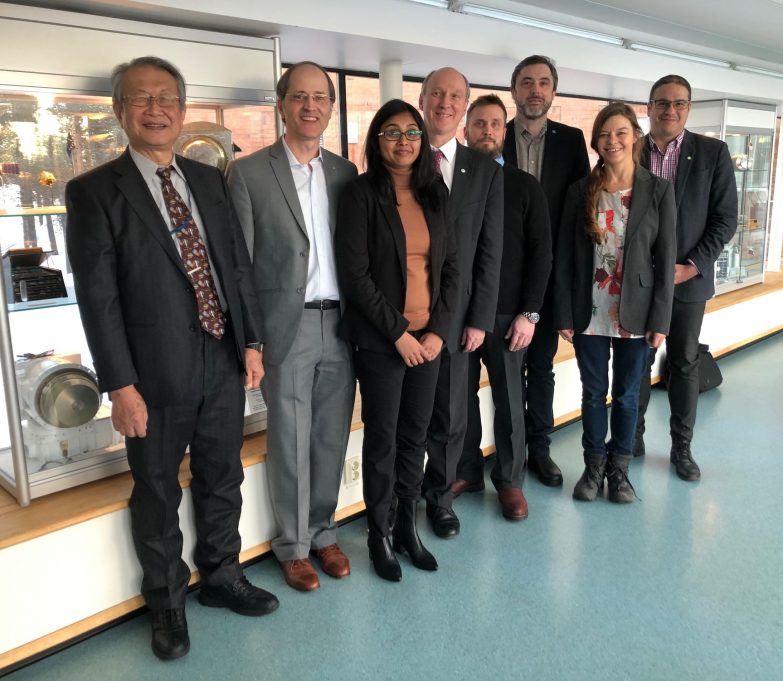
Prof. emeritus Nobuyuki Yajima, opponent, Associate prof. Thomas Kuhn, LTU supervisor, Dr Kanika Garg, Dr. Olle Norberg, Deputy Vice-Chancellor for Space Technology, LTU, Kent Andersson, supervisor SSC, Prof. Mark Pierce, KTH, Dr. Linda Megner, Stockholm University and Prof. George Nikolakopoulos, LTU.
Christo Dortlofva worked with GKN Aerospace in “Qualification aspects in design for additive manufacturing”, which can reduce lead time and cost for production and development of aerospace components as well as accelerate innovation by enabling new design possibilities. We are very happy to announce that Christo will stay with us in the project as a postdoc and continue to work together with GKN Aerospace.
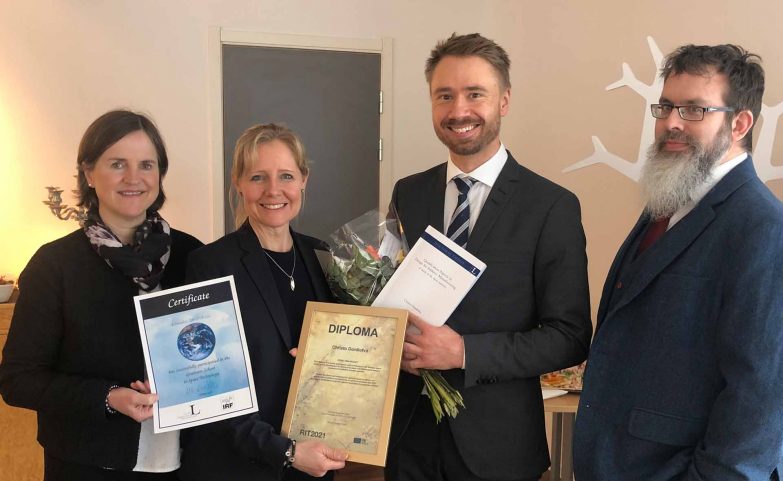
Prof. Marta-lena Antti, Prof. Anna Öhrwall Rönnbäck, supervisor, Dr. Chrsito Dortlofva and Prof. Peter Törlind all at LTU.
In parallell, we are recruiting new PhD:s and postdocs. First in place was Emil Edin, PhD student working with GKN Aerospace in material science; “Stainless Steels for Space Applications”. GKN is also planning for a PhD in addition to Christos employ¬ment as a postdoc mentioned abouve. SSC is planning for 2-4 new postdocs and the two first are already in place: Tayebe Taheri will work with Interference Control and Estimation with a high-Quality Radio Environment Map of Esrange (ICEQREME) and Alexandre Barbosa will work on flight safety for rockets at Esrange. OHB Sweden also has their postdoc in place, Avijit Banerjee, who will work on navigation around small bodies in space. More information about the new R&D projects will be published in the autumn on this web site.
Testbed Space
The development of testlabs at Space Campus is moving forward. IRF is focusing on Spacelab and they will soon publish a new website to promote their research infrastructure. They have also started to collaborate with PASQ, one of our space start-ups within the ESA-BIC offering test services for units going to space.
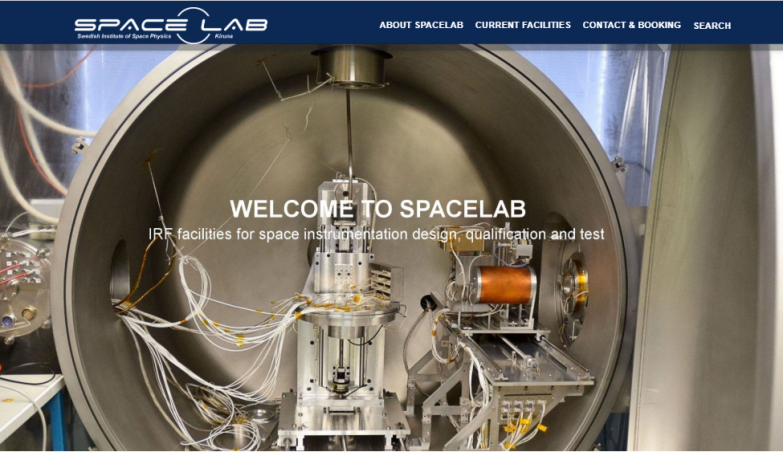
A first peek on the new website for SpaceLab. It will be published in the early fall.
Meanwhile, LTU’s NanoSatLab offers a friction free table to simulate the space environment and is currently developing two new platform in collaboration with the robotic team at LTU in Luleå. Two additional Labs are being developed with vacuum chambers and they will be used for education and research. All research facilities at LTU and IRF are open for external users.
Innovation and business development
Our efforts to build a sustainable ecosystem for the global arena is stepping forward with the aim to attract people, investors, and companies to the region. So far ESA-BIC Sweden and LTU Business have met 21 space related business cases and eight of them have evolved into regional start-ups, a result that we should be very proud of. The next call for new start-ups is October 5th.
Space Innovation Summer
During the summer period LTU Business will run the second round of the student programme “Space Innovation Summer”. It is an initiative were students are employed during the summer to develop space related cases. This year we have four students working with two cases; (1) HIPOR Materials, a research case developed at LTU and (2) Coactum, a start-up with a business case developed by a space student.
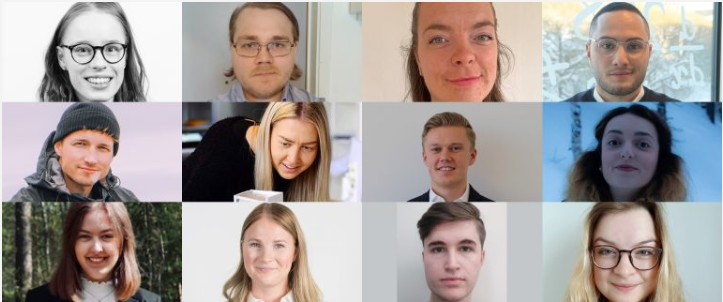
Space Innovation Summer is part of a larger summer programme were all kind of business cases are developed. This summer 20 students and 9 cases are included.
The program is important in several ways. For the students, it is an opportunity to prepare their professional career by gaining relevant and practical experience and making contacts with potential employers. For researchers and companies who participate with a case, it provides a push for new products and business ideas while complementing their own experience with young, driven talents. Read more here.
Aerospace Cluster Sweden
The work to establish the northern node of Aerospace Cluster Sweden is progressing despite challenges due to the Corona pandemic. During this spring LTU Business have tailored and kicked-off a new programme to stimulate business between the established space industry and regional small and medium enterprises (SME’s) interested in entering the space market. The program is called Business Development for Aerospace and it runs in parallel with other activities that enable companies to start looking for new business directly, such as matchmaking and study visits. Six companies are participating in the first round of two planned: Boliden Electro, Coorstek, Actas Space, Mirror, JIT Mech and Midroc. Read more here.
Finally, as you can see RIT2021 is a complex project with a wide range of activities in different fields. I think that we are rather unique in our way of working, finding synergies between our four work packages. Yes, it can be rather demanding, as it often is easier to follow a well trampled road, but I am quite sure that we will reach further and learn more by our collaboration. I would like to thank all of you for the first half within RIT2021. Even though it will be good to take some time off, I look forward to seeing you in September again at the next Space Innovation Forum. This time online! Please take care in these uncertain and demanding times and enjoy a well-deserved holiday.
Johanna Bergström Roos
Project manager RIT 2021
LTU Business
